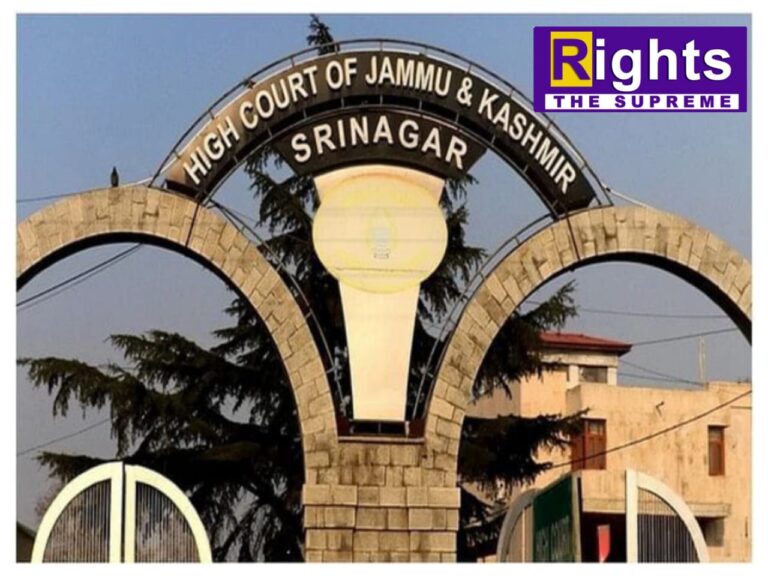In a recent judgement the Jammu and Kashmir High Court ruled that a husband cannot avoid his maintenance obligations to his wife after divorce by merely pronouncing triple talaq. The court examined whether maintenance proceedings under Section 488 of the Criminal Procedure Code (CrPC) could override the husband’s claim that he had already divorced his wife. The bench of Vinod Chatterji Kaul held that for the husband to get away with the obligation of maintenance of the wife after divorce he must prove that all the ingredients of talaq have been fulfilled.
BACKGROUND
Tthe respondent has filled an application under section 488 of criminal procedure code 1973 for maintenance before the court of Judicial Magistrate way back in 2009. Which was dismissed by the court in february 2018 on the grounds that the parties are no longer married to each other thus there is no justifiable reason for maintenance. Aggrieved with the aforementioned decision of judicial magistrate the respondent has filed a revised petition in the Revisional court. Revisional court set aside the order of Judicial Magistrate and stated that the respondent is entitled to maintenance of Rs. 3000 per month from her ex husband.
Aggrieved with the decision of Revisional court the husband (petitioner) has filed a petition before the Srinagar High court on the grounds that the Revisional court does not take into that consideration that the magistrate has passed the order after the proper trial and then it was decided that the parties were no longer married as the petitioner has officially ended the marriage by issuing a Talaknama, which includes three pronouncements of Talaq. This document serves as proof that the petitioner has divorced the respondent and notified her accordingly. The legal process also includes demonstrating efforts towards reconciliation and providing valid reasons for the divorce.
The high court help that the decision of the Revisional court was absolutely right while referring to the famous case of Mohammad Naseem Bhat v. Bilquees Akhter1 wherein the bench of Jammu and kashmir and Ladakh high court has dealt with the same situation which has arised in the instant case. The court held that the mere pronouncement of talaq three times in front of two witness is not enough to validate the talaq ,the witnesses must be endued with justice as the purpose is to ensure that the witnesses, prompted by their sense of justice, may request and persuade the spouses on the verge of separation, to calm down, resolve their disputes and lead a peaceful marital life.
The court also specified that for a husband to be relieved of the responsibilities of the marriage contract, including maintenance, he must formally assert and prove the following:
- Representatives acting on behalf of both the husband and wife made efforts to mediate and settle disputes between them. These efforts must have been unsuccessful through no fault of the husband.
- The husband had a valid and genuine reason for initiating divorce.
- The pronouncement of Talaq was witnessed by two individuals known for their fairness.
- Talaq was pronounced during the period of tuhr (the interval between two menstrual cycles), and there was no sexual relations with the divorcee during this period.
The court also had looked on the statement of 2 witnesses who has gone to there home and they state that the petitioner want to divorce the respondent but she does not agreed to it and the conversation got heated up and ended in pronouncement of that word talaq three times by petitioner and also stated that no efforts of reconciliation was made as well. In addition the High court thus found that the Revisional court has passed the order after taking into consideration the rival contention of parties and supported the order passed by the Revisional court.
CONCLUSION
The recent ruling by the Jammu and Kashmir High Court underscores that a husband cannot evade his obligation to provide maintenance to his wife after divorce solely by pronouncing triple talaq. This case involved a petition questioning whether maintenance proceedings under Section 488 of the Criminal Procedure Code could override the husband’s assertion of having divorced his wife. Presiding over the case, Justice Vinod Chatterji Kaul emphasised that for the husband to be relieved of maintenance responsibilities post-divorce, he must substantiate that all conditions required for talaq have been properly fulfilled. The court upheld a previous decision by the Revisional court, citing precedents and highlighting the importance of fair witnessing and genuine reconciliation efforts in divorce proceedings. This abstract encapsulates the key legal principles and outcomes of the case, illustrating the judiciary’s stance on maintenance obligations post-divorce in the context of triple talaq pronouncements.
Also in the recent judgement of supreme court in the case of Mohd Abdul Samad vs The State of Telangana & Anr (Criminal Appeal No. 2842 of 2024, arising from Special Leave Petition (Crl.) No. 1614 of 2024, Neutral Citation No.: 2024 INSC 506, dated July 10, 2024) stated that the Muslim women who have been unlawfully divorced is entitled to seek maintenance and list it as an addition to the relief provided by the Muslim Women (Protection of Rights on Marriage) Act 2019.
REFERENCE
https://www.scconline.com/blog/post/2024/07/16/triple-talaq-pronouncement-obligations-maintenance-criteria-jandk-ladakh-hc-legal-news/
https://www.scconline.com/blog/post/2024/07/16/triple-talaq-pronouncement-obligations-maintenance-criteria-jandk-ladakh-hc-legal-news/
https://www.advocatekhoj.com/library/judgments/announcement.php?WID=17708

